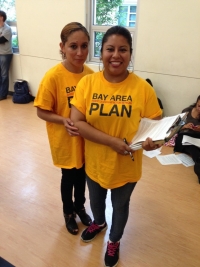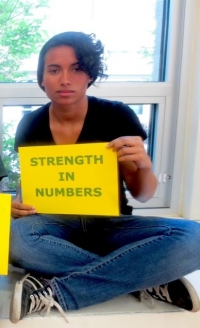
PLAN members Eleazar Cuenca and Maria Guzman at Oakland School Board meeting
For the high school students who turned out for a recent meeting of the Board of Education in Oakland, it tookthree hours of waiting — but they finally got their say as to how state funds would be spent in their schools.
Naudika Williams and Skye Lowe, both student organizers for Californians for Justice (CFJ) came along with parents and members of a coalition that in partnership with Public Advocates is advocating for meaningful parent/student participation in shaping the Local Control and Accountability Plan (LCAP) for Oakland schools. The LCAP spells out exactly how the district will spend some $54 million targeted to provide new or improved services to low-income kids, English language learners and foster youth in Oakland.
When we arrived at La Escuelita Elementary, where the meeting took place, the auditorium was already packed with students waving signs and parent groups in matching t-shirts. In the back of the room, organizers and activists held last-minute strategy sessions with community members, making edits to their testimony. Our team joined the rest of our coalition, a group consisting of community organizations, parents, and students. This was power-building in action. It involved making sure people turned out, strategizing, fine-tuning talking points and of course, waiting.

Oakland high school student Naudika Williams
Finally when the Board members reached the point on the agenda we’d come for, the level of passion in the room was inspiring — parent after parent came forward to offer suggestions for building a cooperative relationship between schools, the board and families. Our partners, including Oakland Community Organizations, Bay Area Parent Leadership Action Network (PLAN) and Californians for Justice (CFJ), advocated for more money to be distributed to individual school sites so that parents and students like Naudika and Skye could work with school leaders to tailor spending to community needs. Parents also sought greater opportunities for engagement at their schools and asked for space in every school for parent committee meetings. Speaking before the board, PLAN organizer Enrique Valencia said, “The main barrier that families face is that their perspective isn’t taken into account in making the decision at the site.”
Through a translator, OUSD parent and PLAN leader Eleazar Cuenca said, “We have to engage more parents so that our schools can thrive.” But Cuenca and Maria Guzman, another OUSD and PLAN parent, both expressed a need for more training for parents so that they can better understand the content of the LCAP.
As student representatives, Naudika and Skye pressed their case clearly and on their own terms, bringing fresh perspectives to the table, and getting a say in education spending as the groups most affected by district and school-site policies. As a result of advocacy from our coalition, with parent and student voice leading the way, OUSD will hire staff in the coming year dedicated to improving parent and student engagement with the LCAP process.
Naudika and Skye left the meeting feeling optimistic about the progress they made in the past year. “What gives me hope is that I can really see that the district, and the parents, and the students are really trying for what’s best for our education,” Naudika said. She and Skye were elected by other students to serve as lead delegates on OUSD’s LCAP Parent-Student Advisory Committee. Between bites of pizza, Naudika commented on the environment in the committee saying, “Everyone’s giving ideas and building on each other — just collaborating as a community, which is really the point of LCAP.”
After speaking with Naudika and Sky, we also left the meeting optimistic that OUSD’s future is in the hands of committed, passionate students and parents. We saw firsthand how community power can help to make lasting change. And as young aspiring attorneys, we learned from the organizers and activists we met, as well as from our supervisor, staff attorney Angelica Jongco, how important it is to engage and work with affected communities – something we’ll surely do when our turn comes to be out there fighting for social justice by using the law.

